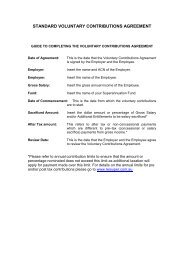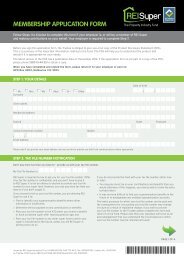Member Information Booklet - REI Super
Member Information Booklet - REI Super
Member Information Booklet - REI Super
Create successful ePaper yourself
Turn your PDF publications into a flip-book with our unique Google optimized e-Paper software.
tax on contributions<br />
From 1 July 2007, super contributions are classified as either<br />
‘concessional’ or ‘non-concessional’.<br />
Concessional contributions<br />
Concessional contributions include superannuation guarantee<br />
(SG) contributions, salary sacrifice contributions, any extra<br />
employer contributions, and contributions for which a tax<br />
deduction is claimed.<br />
Concessional contributions may also include certain other<br />
amounts allocated by the Trustee, certain contributions made by<br />
other people (except the member’s spouse or employer) for the<br />
member, and some parts of an employment termination payment<br />
that you have received from an employer and rolled over.<br />
Concessional contributions up to an annual limit are taxed at 15%.<br />
Note that it will only be possible for the Trustee to pay or refund<br />
this tax up to the amount in your super account.<br />
Any concessional contributions over the limit will also count<br />
towards the limit on non-concessional contributions – see<br />
‘Non-concessional contributions’ below.<br />
non-concessional contributions<br />
Non-concessional contributions include contributions made<br />
from your after-tax salary, spouse contributions made for you,<br />
certain amounts allocated by the Trustee, and any concessional<br />
contributions over and above the concessional contributions limit.<br />
Non-concessional contributions up to $150,000* are generally<br />
tax-free.<br />
* The non-concessional contributions limit is six times the level of the $25,000<br />
concessional contributions limit, and will increase as the concessional limit<br />
moves with indexation.<br />
The ‘bring-forward’ limit is three times the non-concessional contributions<br />
limit that applies in the first year you elect to bring forward contributions.<br />
obtain advice<br />
Since the rules in relation to maximum contributions can be<br />
complex, and could have an important financial impact on your<br />
circumstances, we strongly suggest you obtain professional<br />
advice, such as from your <strong>REI</strong> <strong>Super</strong> Licensed financial planner,<br />
if you think these limits may apply to you.<br />
you’ll pay tax if you exceed the annual<br />
non-concessional limit<br />
If non-concessional contributions exceed these limits in total,<br />
any excess contributions will be taxed at 46.5%. The ATO will<br />
determine whether you have exceeded the limits and whether<br />
you are required to pay any tax. Any tax payable will be your<br />
responsibility, and you must nominate a fund to release money<br />
from your super account to pay the money either as tax to the<br />
ATO or to you if you have already paid the tax yourself.<br />
If you nominate <strong>REI</strong> <strong>Super</strong>, your account balance will be reduced to<br />
take account of any tax paid. When <strong>REI</strong> <strong>Super</strong> pays this additional<br />
tax to you or the ATO on your behalf, a Withdrawal fee of $90 will<br />
apply (see the ‘Fees and other costs’ table on page 20).<br />
page 25<br />
tax on benefits<br />
You may have to pay tax on your super payout when it is paid<br />
from <strong>REI</strong> <strong>Super</strong>. The actual amount of tax depends on:<br />
> your age when you leave the Fund<br />
> the type of payout, and<br />
> certain other factors.<br />
You should obtain advice from a licensed, or appropriately<br />
authorised, financial adviser if you are unsure of what tax you<br />
may have to pay.<br />
your lump sum payout and tax<br />
The tax payable on lump sum super benefits (for reasons other<br />
than death) depends on your age and the different components<br />
that make up your payout.<br />
Lump sum benefits after age 60<br />
You pay no tax on lump sum benefits after age 60.<br />
Lump sum benefits before age 60<br />
Your lump sum payout will be made up of two components:<br />
> a tax-free component – this generally comprises your<br />
personal after-tax contributions, spouse contributions and<br />
an amount that represents the portion of your benefit built up<br />
before 1 July 1983. A higher tax-free amount may apply if you<br />
are totally and permanently disabled. You pay no tax on this<br />
component; and<br />
> a taxable component – this is your super payout, less any<br />
tax-free component. If you take your super payout after you<br />
reach your preservation age but before age 60, you pay no<br />
tax on the first $175,000* of this component and 15%^ tax on<br />
any amount over $175,000.<br />
If you take your super payout before you reach your preservation<br />
age, you pay tax at 20%^ on your total taxable component.<br />
Higher tax rates will generally apply to preserved or restricted<br />
non-preserved super benefits to a temporary resident who has<br />
permanently left Australia.<br />
* Applicable for the 2012/13 financial year. The limit is indexed from 1 July<br />
each year to Average Weekly Ordinary Time Earnings (AWOTE).<br />
^ Where applicable, the Medicare levy is also payable.





